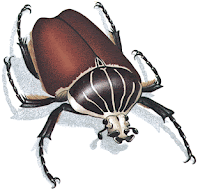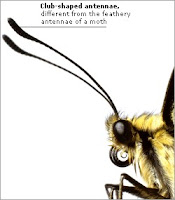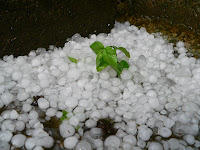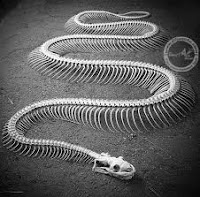Most fishes are covered with scales.
They have fins not legs.
Fishes live in water and breathe through gills.
- The fish takes the water into its mouth.
- The water goes back through the gills.
- The fish keeps the oxigen by the gills.
STRANGE FISHES
- The flying fish is able to "fly" for a short distance.
Animal groups_Fishes
Fish are cold-blooded.
They lay many eggs (oviparus)
Most fishes are covered with scales.
They have fins not legs.
Fishes live in water and breathe through gills.
STRANGE FISHES
They lay many eggs (oviparus)
Most fishes are covered with scales.
They have fins not legs.
Fishes live in water and breathe through gills.
- The fish takes the water into its mouth.
- The water goes back through the gills.
- The fish keeps the oxigen by the gills.
STRANGE FISHES
- The flying fish is able to "fly" for a short distance.
- Insects have six legs.




- The body of an insect has got 3 parts:


- Each insect has got one pair of antenae. These antenae help the insect to find food.

- Insects have got their skeletons on the outside like a shell.

- They can have two or four wings.


- Insects are cold-blooded.


- They don´t have lungs, they only have small openings on their bodies.

- They lay many eggs.

- Most insects go throught a life cycle called metamorphosis. (egg, larva, pupa, adult)
- Most insects go throught a life cycle called metamorphosis. (egg, larva, pupa, adult)
- There are many harmful insects that eat farm crops.
Most reptiles hatch from eggs but not all do. Many snakes have live babies.


Reptiles that live in cold climates hibernate in winter.
Most reptiles shed their skin as they grow.
Reptiles are all cold-blooded animals. When it is cold their bodies and blood become cold. And when it is hot their bodies and blood become warm
Animal groups_MAMMALS
The Water Cycle
THE WATER CYCLE- The water cycle is the movement of water in the enviroment.
- There are 4 phases in the water cycle:
1. Evaporation.2. Condensation.3. Presipitation.4. Collection. Evaporation
Evaporation- Evaporation is when the sun heats up water in rivers or lakes or oceans and turns it into vapor.
- The water vapor leaves rivers, lakes or oceans and goes into the air.

Condensation- Water vapor in the air gets cold and changes back into liquid, forming clouds.
The condesation experiment
Precipitation- Precipitation occurs when so much water has condensed that the air cannot hold it.
- The clouds get heavy and water falls back to the earth in the form of:
RAIN

SNOW

HAIL
SLEET
Collection:
- When water falls back to the earth as precipitation, it may fall back in rivers, oceans, lakes or ends up on land.
- The water that falls back in rivers, lakes and oceans finishes the Water Cycle because it can be evaporated again.
- The water that ends up on the land is going to be drank by animal or plants, or it´s going to go back to rivers, lakes and oceans by the underground.

















No hay comentarios:
Publicar un comentario